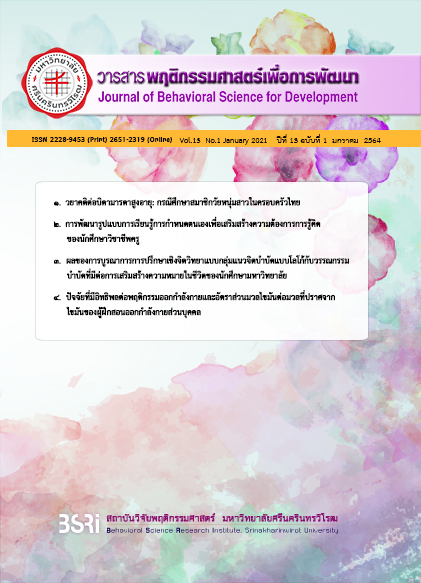A Development the Self-Determination Learning Model for Enhancing Need for Cognition among Pre-service Teacher Students
Keywords:
Need for Cognition, Self-Determination Learning ModelAbstract
The research objectives were to study the factors of need for cognition, to develop and to assess the self-determination learning model for enhancing need for cognition among pre-service teacher students. The samples used for confirmatory factor analysis were 749 third-year pre-service students from universities around the country. The 28 third-year pre-service teacher students from Srinakharinwirot university were randomized to the experimental group and the control group equally. The instruments were (1) need for cognition scale for pre-service teacher students (α = 0.910) and (2) self-determination learning model. The experimental group was provided the self-determination learning model, but the control group was not. The findings found that (1) need for cognition among pre-service teacher students composed of cognitive persistence, cognitive complexity, cognitive confidence, and enjoy in cognition that was fit with the empirical data. (2) students’ need for cognition after receiving the self-determination learning model and after the follow up period was significantly higher than before beginning the experiment at a level of .05 (3) students’ need for cognition after receiving the self-determination learning model and after the follow up period was significantly higher than those in the control group at a level of .05. The results indicated that the self-determination learning model could enhance need for cognition and have important implication to set a policy to promote need for cognition among pre-service teacher students by including learning model into the students’ potential plan.
References
Cacioppo, J. T., & Petty, R. E. (1982). The need for cognition. Journal of Personality and Social Psychology, 42(1), 116-131. https://doi.org/10.1037/0022-3514.42.1.116
Cacioppo, J. T., Petty, R. E., & Kao, C. F. (1984). The efficient assessment of need for cognition. Journal of Personality Assessment, 48, 306-307. https://doi.org/10.1207/s15327752jpa4803_13
Cacioppo, J. T., Petty, R. E., Kao, C. F., & Rodriguez, R. (1986). Central and peripheral routes to persuasion: An individual difference perspective. Journal of Personality and Social Psychology, 51, 1032 – 1043. https://doi.org/10.1037/0022-3514.51.5.1032
Cacioppo, J. T., Petty, R. E., Feinstein, J. A., Blair, W., & Jarvis, G. (1996). Dispositional differences in cognitive motivation: The life and times of individuals varying in need for cognition. Psychological Bulletin, 119, 197-253. https://doi.org/10.1037/0033-2909.119.2.197
Coelho, G. L. H., Hanel, Paul H. P., & Wolf, L. J. (2020). The very efficient assessment of need for cognition: Developing a six-item version. Assessment, 27(8), 1870–1885. https://doi.org/10.1177/1073191118793208
Cohen, A. R., Stotland, E., & Wolfe, D. M. (1955). An experimental investigation of need for cognition. Journal of Abnormal and Social Psychology, 51(2), 291-294. https://doi.org/10.1037/h0042761
Fleischhauer, M., Enge, S., Brocke, B., Ullrich, J., Strobel, A., & Strobel, A. (2010). Same or different? Clarifying the relationship of need for cognition to personality and intelligence. Personality & Social Psychology Bulletin, 36(1), 82–96. https://doi.org/10.1177/0146167209351886
Grass, J., Strobel, A., & Strobel, A. (2017). Cognitive investments in academic success: The role of need for cognition at university. Frontiers in psychology, 8, 790. https://doi.org/10.3389/fpsyg.2017.00790
Hevey, D., Thomas, K., Pertl, M., Maher, L., Craig, A., & Chuinneagain, S. I. (2012). Method effects and the need for cognition scale. The International Journal of Educational and Psychological Assessment, 12(1), 20-33.
Ho, R., & Forsterlee, R. (1999). An examination of the short form of the need for cognition scale applied in an Australian sample. Educational and Psychological Measurement, 59(3), 471-480.
Holverstott, J. (2005). 20 Ways to promote self-determination in students. Intervention in School and Clinic, 41, 39-41.
Moss, S. (2018, December 4). Need for cognition. SICOTESTS. http://www.sicotests.com
Nair, U. K., & Ramnarayan, S. (2000). Individual differences in need for cognition and complex problem solving. Journal of Research in Personality, 34, 305-328.
Nota, L., Soresi, S., Ferrari, L., & Whehmeyer, M. L. (2010). A multivariate analysis of the self-determination of adolescents. Journal of Happiness Studies, 12, 245-266.
Pacini, R., & Epstein, S. (1999). The relation of rational and experiential information processing styles to personality, basic beliefs, and the ratio-bias phenomenon. Journal of Personality and Social Psychology, 76(6), 972-987.
Petty, R. E., Brinol, P., & Tormala, Z. L. (2002). Thought confidence as a determinant of persuasion: The self-validation hypothesis. Journal of Personality and Social Psychology, 82, 722-741.
Ryan, R. M., & Deci, E. L. (2000). Self-determination theory and the facilitation of intrinsic motivation, social development, and well-being. American Psychologist, 55, 68-78.
Ryan, R. M., & Deci, E. L. (2017). Self-determination Theory: Basic Psychological Needs in Motivation, Development and Wellness. Guilford Publishing.
Sadowski, C. J., & Gulgoz, S. (1992). Internal consistency and test-retest reliability of the Need for Cognition Scale. Perceptual and Motor Skills, 74(2), 610.
Scott, E. C., Osvaldo, F. M., & Harmon, M. H. (2004). The factor structure of the need for cognition short form in a Hispanic sample. The Journal of Psychology, 138(1), 77-88.
Shogren, K. A., Palmer, S. B., Wehmeyer, M. L., Williams-Diehm, K., & Little, T. (2012). Effect of intervention with the self-determined learning model of instruction on access and goal attainment. Remedial and Special Education, 33(5), 320-330.
Tanaka, J. S., Panter, A. T., & Winborne, W. C. (1988). Dimensions of need for cognition: Subscales and gender differences. Multivariate Behavioral Research, 23, 35-50.
Trotzer, J. P. (2006). The counselor and the group: Integrating theory, training and practice (4th ed.). Taylor & Francis.
Verplanken, B., Hazenberg, P. T., & Palenewen, G. R. (1992). Need for cognition and extern information search. Journal of Research in Personality, 26, 128-136
Wehmeyer, M. L., Agran, M., & Hughes, C. (1998). Teaching Self-Determination to Students with Disabilities. Paul H. Brookes Publishing Company.



